
Yonatan Ratosh (יונתן רטוש) was the literary pseudonym of Uriel Shelach (Hebrew : אוריאל שלח) (November 18, 1908 – March 25, 1981), an Israeli poet and journalist who founded the Canaanite movement.

Yonatan Ratosh (יונתן רטוש) was the literary pseudonym of Uriel Shelach (Hebrew : אוריאל שלח) (November 18, 1908 – March 25, 1981), an Israeli poet and journalist who founded the Canaanite movement.
Uriel Heilperin (later Shelach) was born in Warsaw, Poland in 1908 to a Zionist family. His father, Yechiel, was a Hebraist educator who raised Uriel and his siblings in Hebrew. In 1921, the family immigrated to Mandate Palestine. Uriel changed his last name from Heilperin to Shelach, later adopting the pseudonym Yonatan Ratosh in his literary and political writing. [1] He attended the Hebrew University of Jerusalem and the Sorbonne, and published his first poem in 1926. In the mid-1930s, he was appointed editor of HaYarden, the official organ of the Revisionist movement and was active in right-wing underground organizations. [2]
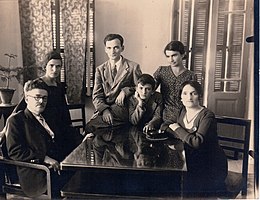
Ratosh was awarded the Prime Minister's Prize. [2] His son Saharon Shelah, a mathematician, won the Israel Prize. Another son, Hamman Shelah, was a magistrate judge who was killed along with his wife and daughter in the Ras Burqa massacre. One of his brothers was linguist Uzzi Ornan. Ratosh died in 1981.
In the late 1920s, Ratosh (using his birth name, Heilperin) embraced Revisionist Zionism, becoming close friends with Eliyahu Bet-Zuri and Avraham Stern. A talented writer, Halperin became the editor of the official publication of the Irgun, "Ba-Cherev" (בחרב, "By the Sword"). In 1937, Jabotinsky demoted Halperin for the extremism of his views. [ citation needed ] Frustrated, he travelled to Paris to meet with another disillusioned Revisionist, Semitic language scholar Adia Gurevitch (A.G. Horon). [ citation needed ] Heilperin and Gurevitch formulated "a new Hebrew consciousness" combining the former's political ideas with the latter's historical outlook. In their minds, the Jewish People were a part of a larger Hebrew civilization bound together by Canaanite languages and nationhood in Canaan. With the outbreak of World War II began writing (as Ratosh) for Haaretz. [ citation needed ]
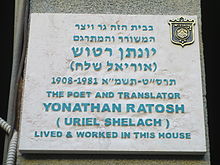
Adopting the pseudonym of Yonatan Ratosh, [1] he began to write poetry that "tore apart" (Hebrew: ריטש - riṭṭêš) existing conventions of style, language, and culture.[ citation needed ] In 1939, he founded the Canaanite movement, which rejected both religion and Jewish nationalism. This group promoted the theory of a shared cultural heritage for the entire Middle East. [2] The literary output of the movement was strongly influenced by an ancient, pre-biblical mythology and vocabulary. Ratosh's own work is closely linked to the movement's political theory. His early poems are very structured, and play with rhyme and repetition to create an almost hypnotic effect. [2] His later work employs colloquial diction and more contemporary style. While the movement founded by Ratosh was never broad, T. Carmi wrote that "its emphasis on myth and its stylistic mannerisms had considerable impact on contemporary poetry." [2]
In an essay entitled "Ketav el ha-No'ar ha-'Ivri" (כתב אל הנער העברי, "Epistle to the Hebrew Youth") from 1943, Heilperin/Ratosh presented his new ideas to the Hebrew-speaking public. This and other essays called for the community of the Yishuv to divorce themselves from their Jewish roots and embrace a new identity as "Hebrews". The "Young Hebrews" became known as the Canaanites, a mocking name coined by Haaretz editor Avraham Shlonsky.
In 1950, Ratosh founded and co-edited the literary journal Alef which published translations of the work of Stendhal, Camus, Shaw and O'Neill. Ratosh continued publishing poetry and enjoyed a brief renaissance as an ideologue after the Six-Day War. His political philosophy had an impact across the political spectrum: sharing the Right's irredentism and advocating a secular (in lieu of Jewish) state like post-Zionists, particularly radical peace advocate Uri Avnery. His last poem in book form was Hava ("Eve"), published in 1963. In it, he reinterprets the story of the Garden of Eden as the coronation of a Rain God.
Ratosh is considered among the pioneers of Hebrew science fiction, having translated in 1952 the anthology "Adventures in tomorrow" edited by Kendell Foster Crossen and including stories by some of the greatest names in the period's Science Fiction. Ratosh signed the translation under his actual name, Uriel Shelach, rather than the Ratosh pen name, and called it היה היה בעתיד (literally "Once Upon a Future"). Due to the dearth of Hebrew SF at the time, Ratosh's translation had a proportionally greater impact in Israel than the original had in the US.

The Hebrews were an ancient Semitic-speaking people. Historians mostly consider the Hebrews as synonymous with the Israelites, with the term "Hebrew" denoting an Israelite from the nomadic era that preceded the establishment of the united Kingdom of Israel. However, in some instances, the designation "Hebrews" may also be used historically in a wider sense, referring to the Phoenicians or other ancient civilizations, such as the Shasu on the eve of the Late Bronze Age collapse. It appears 34 times within 32 verses of the Hebrew Bible. Some scholars regard "Hebrews" as an ethnonym, while others do not, and others still hold that the multiple modern connotations of ethnicity may not all map well onto the sociology of ancient Near-Eastern groups.

Yehoshua Porath was an Israeli historian and professor of Middle East history.

Gush Shalom is an Israeli peace activism group founded by Uri Avnery in 1993. Avnery–a former journalist, Irgun and Knesset member–also led the organization till his death in 2018. The left-wing organization has been involved in several Israeli controversies, such as sending a "Relief Convoy to Gaza" while it is under Hamas administration, and the mainstream Israeli media has described it, on occasion, as "radical" and "extreme". In 2010, the American Friends Service Committee has described the group as "one of Israel's most influential peace organizations".
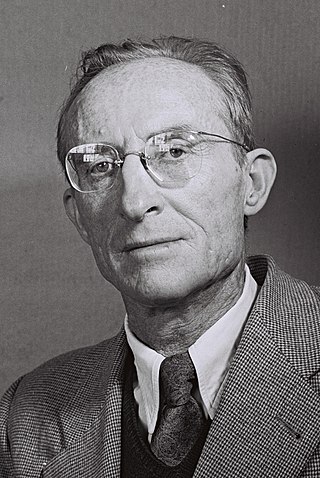
Uri Zvi Greenberg was an Israeli poet, journalist and politician who wrote in Yiddish and Hebrew.

Avraham Shlonsky was an Israeli poet and editor born in the Russian Empire.
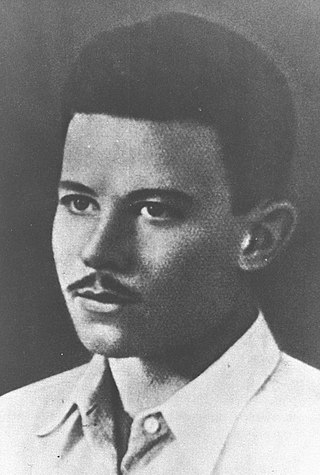
Eliyahu Bet-Zuri was a member of Lehi, who was executed in Egypt for his part in the assassination of Lord Moyne, the British Minister Resident in the Middle East.
Heilprin is a Jewish surname with many variants.

Janice Rebibo was an American-born Israeli poet who began writing in Hebrew in the mid-1980s.

Abba Ahimeir was a Russian-born Jewish journalist, historian, and political activist. One of the ideologues of Revisionist Zionism, he was the founder of the Revisionist Maximalist faction of the Zionist Revisionist Movement (ZRM) and of the clandestine Brit HaBirionim. Colin Shindler contends that the title of 'Father of the Revolt' should be shared equally between Ze'ev Jabotinsky and Ahimeir.
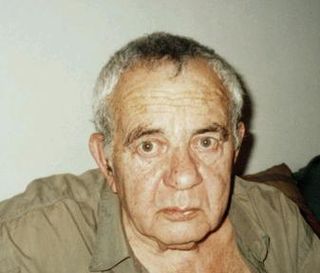
Amos Kenan, also Amos Keinan, was an Israeli columnist, painter, sculptor, playwright and novelist.

Nathan Yonathan was an Israeli poet.
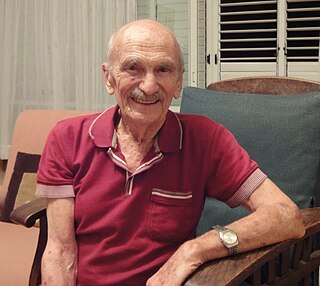
Uzzi Ornan was an Israeli linguist and social activist. Ornan was a member of the Academy of the Hebrew Language, professor of natural languages computing at the Technion and professor emeritus at the Hebrew University of Jerusalem. Ornan was a member of the Israeli Canaanite movement, founded by his brother Yonatan Ratosh. He was the founder of the League against religious coercion in Israel and an active supporter of the separation of church and state.

Aharon Amir was an Israeli Hebrew poet, a literary translator and a writer.

The common definition of Zionism was principally the endorsement of the Jewish people to establish a Jewish national home in Palestine, secondarily the claim that due to a lack of self-determination, this territory must be re-established as a Jewish state. Historically, the establishment of a Jewish state has been understood in the Zionist mainstream as establishing and maintaining a Jewish majority. Zionism was produced by various philosophers representing different approaches concerning the objective and path that Zionism should follow.
Semitic Action was a small Israeli political group of the 1950s and 1960s which sought the creation of a regional federation encompassing Israel and its Arab neighbors.

Canaanism was a cultural and ideological movement founded in 1939, reaching its peak among the Jews of Mandatory Palestine during the 1940s. It has had a significant effect on the course of Israeli art, literature and spiritual and political thought. Its adherents were called Canaanites. The movement's original name was the Council for the Coalition of Hebrew Youth or less formally, the Young Hebrews; Canaanism was originally a pejorative term. It grew out of Revisionist Zionism and had roots in European extreme right-wing movements, particularly Italian fascism. Most of its members were part of the Irgun or Lehi.

Uri Avnery was a German-born Israeli writer, journalist, politician, and activist, who founded the Gush Shalom peace movement. A member of the Irgun as a teenager and a veteran of the 1948 Palestine war, Avnery sat for two terms in the Knesset from 1965 to 1974 and from 1979 to 1981. He was also the owner and editor of the news magazine HaOlam HaZeh from 1950 until its closure in 1993.

Shin Shifra ; is the pen name of Shifra Shifman Shmuelevitch, a poet, translator, writer, editor and literary academic. Shifra won multiple literature awards.